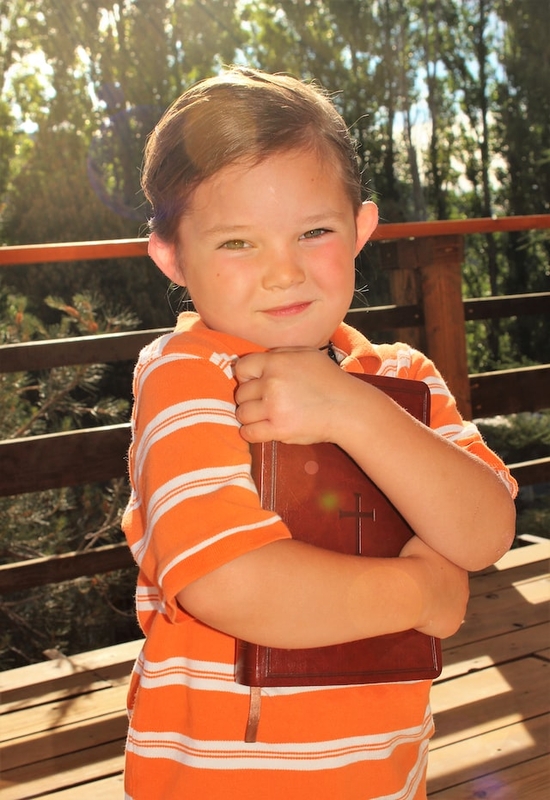The Seventh-day Adventist Church operates the largest Protestant education system in the world. A big part of this system is our K-8 elementary schools, or primary schools, as they’re known in other parts of the world.
Here you can learn all about:
- The mission of Adventist elementary schools
- The benefits of attending these schools
- Differences between Adventist schools and other types of schools
- What to expect at an Adventist elementary school
- What the statistics tell us
Let’s begin with the reason they exist in the first place.
What is the mission of Adventist schools?

Photo by David Clode on Unsplash
Every kid is loved by God and gifted in their own unique way. The goal of Adventist education is to equip them with the knowledge they need, and to support their educational process by providing a Christ-centered environment.
At Adventist elementary schools, a high-quality curriculum is accompanied by an emphasis on biblical principles. The focus is in educating the whole person—intellectually, physically, emotionally, and spiritually.
And above all, everything students learn points toward the amazing power and love of God. The faculty and staff want to help each kid form their own relationship with Jesus Christ as they learn to be active participants in their communities.
The programs, activities, and curriculum are all designed to support this “whole-istic” model. Kids are educated with the facts they need to know to meet the standards for each grade level, but the learning experience is enriched with a biblical perspective for each subject, and numerous opportunities for hands-on learning.
After all, the elementary years are foundational for each kid’s educational future. It’s never too early to start teaching kids about the wonders of God’s creation, and we can see His hand in every subject we study.
So how did the Adventist education system come to be what it is today? What sparked the emphasis on Christian education? Let’s go back to the late nineteenth century to look at its origins.
What’s the history of Adventist schools?
The first Adventist school was started in 1872, in Battle Creek, Michigan. The idea was to train students to become missionaries for the gospel in whatever field of study they chose, and whatever career they were preparing for.
There was also concern that the schooling systems of the time were not rigorous enough. After all, this was around the time of the Second Industrial Revolution, and there was more focus on hurrying kids through school so they could work in the many factories popping up all over the United States.
In fact, sometimes kids would be sent to work without finishing their education at all!
Early leaders of the Adventist Church noticed that this could deprive children from learning important, foundational principles that could guide and structure their lives. So they began building schools that could give the kids the educational framework they needed, along with important biblical principles.
From this humble beginning, the Adventist education system has grown to include everything from Pre-K and TK (Transitional Kindergarten) all the way up to medical and graduate schools.
And as part of this system, Adventist elementary schools can be found in almost every corner of the globe.
By the end of 2020, there were 6,623 Adventist elementary schools, with a total enrollment of 1,268,405 students.1
So what are the perks of attending Adventist Christian schools?
We’ll look at that next.
Benefits of Adventist elementary schools

Photo by Elisabeth Wales on Unsplash
Elementary schools operated by the Seventh-day Adventist Church are fully-accredited private Christian schools. They provide a safe learning environment and a rigorous yet differentiated curriculum to ensure that each student can thrive in this faith-based setting, regardless of their background.
Benefits of attending such a Christian school include:
- Religion classes as part of the curriculum. Students get to learn more about God, the Christian faith, and best of all, they learn how to find a friend in Jesus.
- Biblical principles enhance every subject of learning. Kids learn about God’s creation instead of just evolution, and they’re shown how His creative signature is all throughout science, social studies, reading, art…everything.
- Christian values are cultivated and affirmed in students throughout their social and academic interactions. Values like honesty, kindness and compassion, respect, generosity, etc. This is especially possible because they get to learn from Christian teachers.
- Adventist schools tend to have a smaller student body and a more favorable student-teacher ratio. This helps the school community feel more like a family environment. This also makes it easier for parents to participate in the school life of their kids.
And because they are “Adventist” schools, they also have benefits that cater specifically to Adventist students and their families. Benefits like:
- The school’s philosophy is based on an Adventist worldview, which emphasizes the need for Jesus in our troubled world today. Kids are taught not to fear what is happening around us, but to trust in God to show us the way through challenging situations.
- The Sabbath is upheld in weekly schedules. Respecting this day of rest and enjoyment of God’s creation, extracurricular events are not scheduled on Saturdays (except for worship-related activities). But classes, sports, etc., will not be scheduled during Sabbath hours.
- Students have the opportunity to participate in their local church’s activities and community outreach. Many of our schools have planned mission trips, whether local or farther away. And this instills a love for mission and evangelism in students from a young age.
- Health is emphasized and prioritized. Meals and activities are organized to support the health of kids’ minds and bodies, which can help them be in an optimal state for learning.
What is the difference between private Adventist schools and other schools?
While Adventist schools resemble other private schools in some ways, they carry some differences that stand out.
Here are some areas where Adventist schools are different.
- The cost2
Like other private schools, the cost of Adventist education will be higher than public or charter schools. But families that send their kids to these schools realize that they are paying for priceless benefits.
Most Adventist elementary schools offer financial assistance programs or other options to help families that might struggle with tuition costs.
2. The curriculum3
The curriculum at Adventist schools is faith-based, knitting Bible principles into everyday learning. This makes Adventist schools different from non faith-based schools.
The curriculum is also designed for both single and multigrade classrooms. Having students in different grade levels studying together allows for peer tutoring, where older students can help the younger.
Some schools can even have students interact with college students and professors from Adventist colleges.
The curriculum can also be tailored to the learning needs of each student, resulting in a more personalized student learning experience.
3. The community
When you send your kids to an Adventist elementary school, you’re also joining a family. The close-knit community of Adventist elementary schools is a common benefit described in countless messages of feedback over the years.
While your young scholar is the one actually attending class, your whole family is considered a member of the campus. Faculty, staff, and volunteers want to support you as a family unit, and to help your kids succeed in their education and development.
Some things to consider:
While the benefits of Adventist education are abundant, it’s important to consider that as a smaller private school, there are some ways we won’t be able to compare to a state-funded public campus.
Many of our schools are not able to provide a full special education program, a gifted student curriculum, or specific/specialized extracurricular activities.
But to compensate for these in a positive way, most Adventist schools provide robust child development programs to cultivate students’ gifts and usefulness.
We’ll look at these next, and what to expect at an Adventist elementary school.
What should you expect at an Adventist school?

Photo by National Cancer Institute on Unsplash
Walking into an Adventist school, you’ll most likely first see what you consider normal for a school—classrooms, buses, sports fields, etc.
Some schools have both elementary and high school grade levels on the same campus. So you’ll see students of all ages, all the way from kindergarten to 12th grade.
But as you give it a closer look, you’ll probably notice the caring, Christian atmosphere.
Classes often start with prayer and devotion from the teacher or a student.
Teachers are lovingly committed to their students, willing to work with them and help them in their own personal journey.
You’ll likely notice how many students are involved in various activities, depending on the time of the day or season during the school year.
They could be in class learning, out in the field playing a game for physical education, or in the cafeteria enjoying a healthy meal.
There are also facilities for students to nurture their talents in areas like fine art, visual arts, STEM activities, and music. And students are also encouraged to participate in various athletic programs like softball, basketball, gymnastics, track and field, etc.
With all these benefits to a student’s experience, Adventist education has proven to be an excellent choice for many parents and students.
But you don’t have to take our word for it. Let’s look at the data.
Studies and statistics about Adventist schools
A couple significant research studies have shown that Adventist grade schools can be a highly beneficial choice. Let’s look at each of them:
1. The Cognitive Genesis Study
This study was conducted at La Sierra University between 2006 and 2010.
It showed that Adventist grade schools outperformed the national average in all subjects, grades, and in schools of all sizes.
This means that students have a higher graduation rate and college acceptance.
According to the study, the result is due to Adventist schools’ focus on each student as a whole person. It’s recognized that these kids need guidance not just in memorizing information, but learning how to apply it to each aspect of their early lives, including their spirituality.4
2. William H. Jeynes’ Study
Dr. William H. Jeynes, a professor of education at California State University, conducted a study that compared academic performance between religious, public, and charter schools.
The study showed students attending faith-based schools were academically ahead of their counterparts by about a year.
And here’s where it gets even more interesting.
When students in Adventist elementary and middle schools were included in the study, they were about 10 months ahead of their counterparts, including other Christian schools.
And even considering factors like socioeconomic status, race, and gender, they were still 5 months ahead.
Jeynes also noted that the gap increased in high school students who have attended Adventist schools longer. This shows how this advantage can compound over time.
There was also a social and behavioral advantage in Adventist schools. Adventist campuses often showed a higher level of student diversity, as well as fewer behavioral problems on campus, and a greater degree of harmony between students of different races and backgrounds.5
And apart from academic excellence, Adventist schools also nurture students’ God-given gifts and talents. They even produce great student athletes, who often go on to play in varsity teams.
But above all, Adventist schools cultivate the spiritual lives of students. They aim to provide a solid Christian foundation for their young lives.
Adventist elementary schools prepare students for eternity
It will always be the goal for Adventist elementary schools to provide students with a holistic Christian education. We want to prepare each and every kid to love themselves as an individual, as a child of God, and as a blessing for their community and for society, both now and for eternity.
If you’re interested in learning more, you can start by locating an Adventist school nearest to you.
You can then book an appointment to visit the school, receive more information, or attend the school’s open house to learn more of what they offer.
To learn more about the entire Adventist education system at all levels,
- “Quick Statistics on the Seventh-day Adventist Church.” ASTR – Office of Archives, Statistics, and Research. General Conference Corporation of Seventh-day Adventists. [↵]
- “Are Adventist Schools Worth The Cost?” Adventist Guide. [↵]
- “10 Reasons Adventist Schools Work.” The Journal of Adventist Education, (2021). [↵]
- Kido, Elissa. “For Real Education Reform, Take a Cue from the Adventists.” The Christian Science Monitor Logo, November 15, 2010. [↵]
- Jeynes, H. Williams, Peabody Journal of Education, Vol. 87, pp. 305-335. [↵]
Related Articles
More Answers
What is the Role of Laypeople vs. the Role of Clergy?
The word “laity” comes from the Greek word laikos, which means “of the people.”
Do Seventh-Day Adventists Have “Rules” For Clothing?
Many religions have guidelines on dress, but what about the Adventist Church? Discover how Adventists choose to dress based on biblical principles.
11 Reasons People Become Seventh-day Adventists
Curious why many people become Adventists? Here are elements of Adventist beliefs, values, and mission often reflected in people’s decisions to join.
What’s the Seventh-day Adventist General Conference Session?
At the General Conference Session, Adventist delegates from around the world gather to assess the state of the organization, pray, and discuss current issues. Here’s how it works.
How Adventists View the End of the World
The end of the world is no fun to think about. But here’s how we can actually find hope and comfort in what’s to come.
What Is an Adventist Medical Missionary?
A medical missionary in the Adventist Church is someone who cares for the medical needs of people as a way of showing the love of Jesus. They may travel to another country, or even just serve in their hometown.
Is the Seventh-day Adventist Church Protestant?
Learn how the beliefs of the Seventh-day Adventist Church align with the “5 solas” of Protestantism.
Are Seventh-day Adventists Evangelicals?
According to its origins and definition, evangelicalism is about following Jesus and the Bible and sharing the Gospel through the way we live our lives. Adventists wholeheartedly harmonize with these principles.
Could Anything Keep Me from Becoming an Adventist?
We are each saved through Christ. But when it comes to church membership, are there certain beliefs or expectations to become an Adventist?
Do Seventh-day Adventists Have “Rules”?
We uphold principles we believe will help us maintain a closer relationship with Jesus and His Word. Learn how these principles guide Adventist lifestyles.
Do Seventh-day Adventists Have “Rules” For Marriage?
Around the world, many cultures and religions have various marriage traditions, expectations, or even rules when it comes to choosing a partner, planning the wedding, extended family logistics, or a number of other things.
Can a Seventh-day Adventist Marry a Non-Adventist?
Yes. Seventh-day Adventists are not under any official rules that dictate who they can or cannot marry. This is a personal, life-altering decision between the couple and God.
What Adventists Believe About Alcohol and Tobacco Use
The Seventh-day Adventist Church has historically discouraged the use of alcohol and tobacco. Even before the church started in 1863, its leaders were realizing the negative effects of these substances.
Jewelry—Why Do Many Seventh-day Adventists Choose Not to Wear It?
If you walk into a Seventh-day Adventist church service, you might notice that many people aren’t wearing earrings, bracelets, necklaces, or sometimes even wedding rings.
International Pathfinder Camporee
Youth aged 10-15 in the Adventist Church’s global Pathfinder program look forward to the International Camporee every 5 years. This event brings together Pathfinders from around the world for exciting activities.
How Adventists interpret Bible prophecy
Bible prophecy conjures up a variety of emotions in people. For some, it feels exciting or mysterious.
Moviegoers’ Guide to The Hopeful: The Facts Behind the Film
Learn where and when you can watch The Hopeful and how to get tickets. Already seen it? We’ll uncover the real story that inspired this film.
How Are Seventh-day Adventists Different from Other Protestants?
As a Protestant Christian denomination, the Seventh-day Adventist Church regards the Bible as the ultimate guide and looks to Jesus Christ as the only way to salvation. We do have some differences of belief or interpretation when it comes to topics like Bible prophecy, end-time events, the Sabbath, and a person’s state after death.
How Adventists Handle Death and Funerals
Most Seventh-day Adventist funeral services are similar to those of other Protestant denominations, such as Methodists, Baptists, or Presbyterians, but you might find a few differences or unique nuances.
Adventist Culture
Many Seventh-day Adventists adhere to specific lifestyle principles that can make them stand out from those in other Christian denominations. Whether it’s going to church services on Saturday or eating the popular Adventist entrée of “haystacks.”
Do Adventists Observe Easter-Related Holidays?
Jesus Christ’s resurrection, celebrated on many Easter-related holidays, is central to the beliefs of the Seventh-day Adventist Church. And that means we seek every opportunity to remember it.
An Overview of Seventh-day Adventist Higher Education
The Seventh-day Adventist Church has about 118 tertiary schools around the world. Though many of them are within North America, you’ll also find Adventist universities in countries across the world—places like Croatia, Austria, Brazil, Madagascar, and the Philippines.
The Ten Commandments from a Seventh-day Adventist Perspective
Ever eaten a salad and gotten a big piece of green stuck in your teeth? And you didn’t realize it was there until you looked in the mirror? (Because no one ever told you!)
The Benefits of A Seventh-day Adventist Academy
Adventist academies are high schools (grades 9-12) that are owned and operated by the Seventh-day Adventist Church.
Are Seventh-day Adventists Christians?
Yes, the Seventh-day Adventist Church is a Protestant Christian denomination formed in 1863. Just like other Christians, we believe that Jesus Christ is our Savior and seek to follow the principles of the Word of God.
Adventist Movies: Where Faith and Film Meet
The Adventist Church uses film to share our faith and uplift positive values. Learn more about specific Adventist-produced films and where to find them.
Do Adventists Celebrate Christmas?
In general, most Seventh-day Adventists do celebrate Christmas.
Since our denomination doesn’t have specific guidelines about holidays, it’s up to each member to decide whether to celebrate it based on their personal convictions and study of the Bible.
What Does the Bible Say About Modesty
Seventh-day Adventists and Christians in general try to ensure their outward presentation and lifestyle glorify God. This often involves daily habits like the ways we hold conversations, the ways we dress and accessorize, and the ways we regard other people when we’re out and about.
How Do Adventists Make Movie and Music Choices?
How do Adventists decide what music to listen to and which movies to watch? Learn how Bible principles can help us make better entertainment choices.

































